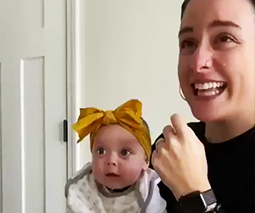Bringing up baby bilingual: Why two languages are better than one

You don’t have to be a language expert to think of a few good reasons you might want to speak a second language.
Aside from being a life goal of many adults who are endlessly slogging away at Spanish lessons, bilingualism can have an incredible effect on the brain. In fact, raising children to be bilingual has captured the attention of researchers at the MARCS Institute at Western Sydney University who believe it can reveal some incredible abilities in babies’ brains.
Now BabyLab, a new podcast from Babyology, created in collaboration with Western Sydney University, investigates all the benefits of bringing baby up bilingual.
Listen to the full episode of BabyLab
Same, same but different
Dr Liquan Liu and other researchers at BabyLab at Western Sydney University have been using EEG caps – a snug cap of electrodes placed over a baby’s head – as well as eye-tracking software, audio recording and other techniques to track how a bilingual baby develops and uses language differently to a mono-lingual one.
“We know now that bilingualism causes a difference – it will wire your brain slightly differently – it actually makes you more plastic, more flexible and better at inhibition control,” explains Liquan.
“So when you speak the word ‘dog’, not only is ‘dog’ activated, but also ‘cat’ ‘animals’ or even some sound that is similar to the word ‘dog’. And then in the bilingual mind, not only one language is activated – the other is too – so you have to be able to inhibit all the other competitors and be able to speak the right word ‘dog’.”
For those of us who have become bilingual later in life – starting to learn a second language in childhood or adulthood – there is a constant need to consciously choose words and suppress words to find the right word in the right language. But in bilingual babies, this comes naturally.
Constantly switching parts of your brain on and off as you switch between different languages has what researchers call ‘cross -domain’ effects.
Which means that it doesn’t just have a positive effect on the part of your brain that processes language, but it improves other parts of your brain too.

The lifelong benefits of bilingualism
Learning two languages has wonderful benefits to the brain – it makes the brain more flexible, it’s able to switch between tasks, very easily, to maintain attention and to remember and store, and manipulate information that it’s hearing.
“We know that children who are learning more languages have more flexible thinking and understanding about how language is used; they show some cognitive benefits in terms of memory and attention processes,” says Dr Karen Mattock from Western Sydney University.
There are obvious benefits for these traits to develop in young kids. But these benefits don’t just benefit babies brains.
“We see the benefits of bilingualism in adulthood and into older age as well. There’s some evidence that using two languages across life, offers great benefits, and prevents memory decline in older age,” explains Karen.
Yep, research has shown that bilingualism can delay the onset of age-related diseases like dementia by 4 to 5 years.
Read more about baby language development:
- Baby talk: The ‘silly’ thing parents can do to improve their baby’s language
- How babies learn to talk before they’re even born
- Raising a bilingual baby: The pros and cons
Is it too late for us to become bilingual?
But if your parents didn’t teach you a second or third language when you were a baby, never fear! All hope is not lost …
Dr Mark Antoniou from Western Sydney University has done fascinating studies about the impact of learning a second language as an adult.
“One study we do here is teach a foreign language to older adults, 65+ and if I’m being blunt, we don’t care if they learn the language or not – we’re using it as an exercise to keep their brains active and healthy.”
What the researchers have found is that people who take part in language learning training for a number of months, show improvements in a number of cognitive tests. Which all suggests that they’re going to have better attention and memory.
Mark is optimistic about the long-term benefits of this type of language learning: “Hopefully if we can do it long enough, [this will] delay the onset of neurological diseases like Alzheimer’s or dementia.”
You can listen to BabyLab with Apple Podcasts and Google Podcasts











